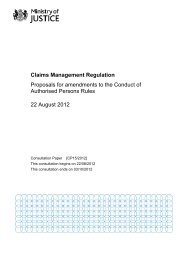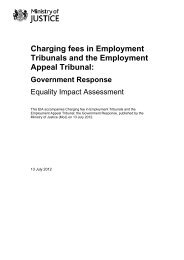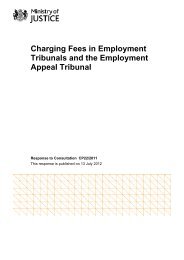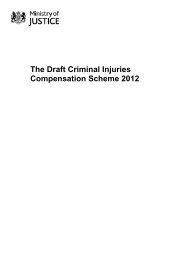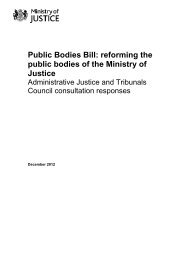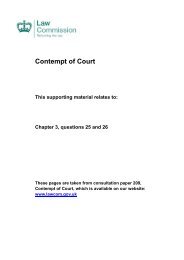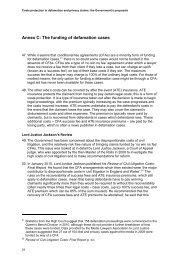Appointments and Diversity 'A Judiciary for the ... - Ministry of Justice
Appointments and Diversity 'A Judiciary for the ... - Ministry of Justice
Appointments and Diversity 'A Judiciary for the ... - Ministry of Justice
You also want an ePaper? Increase the reach of your titles
YUMPU automatically turns print PDFs into web optimized ePapers that Google loves.
<strong>Appointments</strong> <strong>and</strong> <strong>Diversity</strong> A <strong>Judiciary</strong> <strong>for</strong> <strong>the</strong> 21st Century’<br />
Response to public consultation<br />
Question 12: Should <strong>the</strong> Lord Chancellor make recommendations directly to HM<br />
The Queen instead <strong>of</strong> <strong>the</strong> Prime Minister (S26 <strong>and</strong> 29 CRA <strong>and</strong> convention)<br />
84. Overall <strong>the</strong>re were 31 responses submitted in relation to this question. Of those, <strong>the</strong>re<br />
were 22 responses that were <strong>for</strong> <strong>the</strong> proposal; while three did not support <strong>the</strong><br />
proposed change <strong>and</strong> six were neutral.<br />
85. The majority <strong>of</strong> those who responded in support <strong>of</strong> <strong>the</strong> proposal saw <strong>the</strong> role as a<br />
redundant additional layer to <strong>the</strong> process <strong>and</strong> that <strong>the</strong> Lord Chancellor could make<br />
<strong>the</strong>se recommendations. However, some <strong>of</strong> those who did support <strong>the</strong> proposal<br />
advocated that if it was decided that <strong>the</strong> Lord Chancellor should sit on selection<br />
panels <strong>the</strong>re may be a need to retain <strong>the</strong> role <strong>of</strong> <strong>the</strong> Prime Minister at least in relation<br />
to those roles where <strong>the</strong> Lord Chancellor was on <strong>the</strong> panel.<br />
86. Those who supported <strong>the</strong> retention <strong>of</strong> <strong>the</strong> role considered it was important that <strong>the</strong><br />
Executive was involved <strong>and</strong> that <strong>the</strong> Prime Minister role was a useful safeguard. A<br />
number <strong>of</strong> respondents suggested that <strong>the</strong>y were neutral on <strong>the</strong> matter or that this<br />
was a matter <strong>for</strong> Government. The House <strong>of</strong> Lords Constitution Committee made no<br />
observation on this proposal.<br />
87. Upon analysis <strong>of</strong> <strong>the</strong> responses received we have concluded not to make any<br />
changes to <strong>the</strong> role <strong>of</strong> <strong>the</strong> Prime Minister at this time. We agree with <strong>the</strong><br />
observations around <strong>the</strong> role <strong>of</strong> <strong>the</strong> Prime Minister being useful in relation to those<br />
appointments where <strong>the</strong> Lord Chancellor is, in <strong>the</strong> future, on <strong>the</strong> selection<br />
commission or panel. There<strong>for</strong>e, as we are proposing changes to <strong>the</strong> Lord<br />
Chancellor’s role we do not consider it is <strong>the</strong> correct time to also make changes to <strong>the</strong><br />
Prime Minister’s role <strong>and</strong> will retain his current role in <strong>for</strong>mally <strong>for</strong>warding <strong>the</strong><br />
recommendation to HM The Queen.<br />
Improving diversity<br />
Question 13: Do you believe that <strong>the</strong> principle <strong>of</strong> salaried part-time working<br />
should be extended to <strong>the</strong> High Court <strong>and</strong> above If so, do you agree that <strong>the</strong><br />
statutory limits on numbers <strong>of</strong> judges should be removed in order to facilitate<br />
this (Sections 2 <strong>and</strong> 4 <strong>of</strong> <strong>the</strong> Senior Courts Act 1981)<br />
88. Overall <strong>the</strong>re were 47 responses submitted in relation to this question. There was<br />
unanimous support <strong>for</strong> <strong>the</strong> principle <strong>of</strong> part-time working although two respondents<br />
did query whe<strong>the</strong>r this could be operated effectively in <strong>the</strong> Court <strong>of</strong> Appeal or<br />
Supreme Court.<br />
89. Those who advocated <strong>the</strong> proposal highlighted <strong>the</strong> point that many saw <strong>the</strong> extension<br />
<strong>of</strong> salaried part-time working to <strong>the</strong> higher courts as an enabler to encouraging a<br />
more diverse judiciary <strong>and</strong> also <strong>the</strong> removal <strong>of</strong> something many see as a barrier to<br />
applying to higher judicial <strong>of</strong>fice.<br />
90. The House <strong>of</strong> Lords Constitution Committee heard from a number <strong>of</strong> witnesses who<br />
advocated this change as being one which <strong>the</strong>y believed would have <strong>the</strong> greatest<br />
impact on increasing <strong>the</strong> diversity <strong>of</strong> <strong>the</strong> judiciary. The Committee observed that:<br />
We agree that <strong>the</strong> Senior Courts Act 1981 should be amended to remove <strong>the</strong> limits<br />
on <strong>the</strong> number <strong>of</strong> individuals able to serve as High Court <strong>and</strong> Court <strong>of</strong> Appeal judges<br />
19



